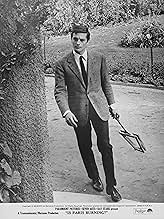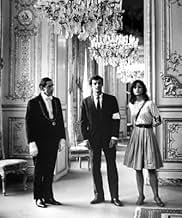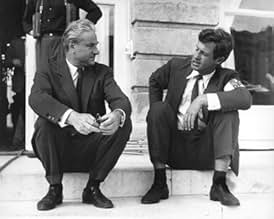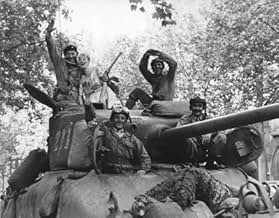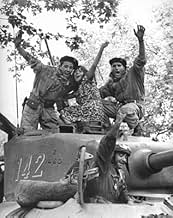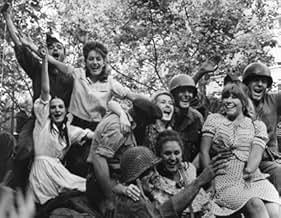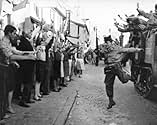IMDb-BEWERTUNG
6,8/10
5437
IHRE BEWERTUNG
Die Abreise der deutschen Armee aus Paris im Jahr 1944.Die Abreise der deutschen Armee aus Paris im Jahr 1944.Die Abreise der deutschen Armee aus Paris im Jahr 1944.
- Für 2 Oscars nominiert
- 4 Nominierungen insgesamt
George Chakiris
- GI in Tank
- (as Georges Chakiris)
Gert Fröbe
- General Dietrich von Choltitz
- (as Gert Froebe)
Empfohlene Bewertungen
In August 1944, Adolf Hitler assigns General Dietrich von Choltitz (Gert Froebe) to be in the military governor of Paris and to burn the city in case of the Allied forces arrival. Meanwhile, the French resistance has internal fights of the different factions and leaderships. One French major convinces the Allied forces to liberate Paris from the Germans. General von Choltitz disobeys Hitler's orders and spares Paris from destruction.
"Paris brûle-t-il?", a.k.a. "Is Paris Burning?", is an underrated French super production about the liberation of Paris in World War II. It is impressive the number of stars in this movie, directed by René Clément; screenplay by Francis Ford Coppola; music by Maurice Jarre. There are many cameos of great actors and also a huge number of bit players. Unfortunately the dubbing in English is awful. Fortunately this German general did not destroy one of the most beautiful cities in the world. My vote is eight.
Title (Brazil): "Paris Está em Chamas?" ("Is Paris Burning?")
"Paris brûle-t-il?", a.k.a. "Is Paris Burning?", is an underrated French super production about the liberation of Paris in World War II. It is impressive the number of stars in this movie, directed by René Clément; screenplay by Francis Ford Coppola; music by Maurice Jarre. There are many cameos of great actors and also a huge number of bit players. Unfortunately the dubbing in English is awful. Fortunately this German general did not destroy one of the most beautiful cities in the world. My vote is eight.
Title (Brazil): "Paris Está em Chamas?" ("Is Paris Burning?")
This film is a very well done dramatisation of the account of the liberation of Paris in August of 1944.History buffs take note;notice the mascot names of the tanks in General Leclerc's Free French armoured division.Many had Spanish names such as "Madrid" "Teruel" & "Zaragosa" as these vehicles were manned by anti-Fascist Spanish refugee fighters who played a largely important yet mostly un-acknowledged part largely ignored by mainstream historians about the WW2 period.
The film concerns about the Allies advance on Paris during WWII, in a remarkable act of courage, several French Resistance groups(Bruno Cremer,Alain Delon,Jean Paul Belmondo,Georges Geret,Bernard Fresson, among others) confront to regain Paris from the Nazis, who rule tyrannically the city and detailing the last days before the liberation. The German general in charge Von Choltitz (Get Froebe) is under direct orders from Hitler to destroy Paris, rather than left to the Allied, commanded by general Omar Bradley(Glenn Ford) and general Patton(Kirk Douglas) . But the Resistance fighters eventually take over Paris and Van Choltitz decides not to burn the city but to let intact to the liberators , as he thought which destroying it no useful for the future like a mankind legacy.
This is a spectacular pseudo-documentary style developing the liberation of Paris with the Resistance factions and tryings to burn the city by Nazy hierarchy . It's a co-production French and Paramount US with a plethora of international actors, many of them playing cameos and prestigious intervention. Special mention to Bruno Cremer as Resistance chief , Orson Welles as Sweden consul and Leslie Caron as fighter wishing to free her husband. The short details-characters about Resistance leaders only for a minutes are based on the stories of real-life people. Appear historical characters well incarnated by famous players Omar Bradley(Glenn Ford),George Patton(Kirk Douglas) General Lecrec(Claude Rich), Von Choltitz(Get Froebe), among others. The title movie comes from the continuous phone calls realized by Hitler to Von Choltitz that always began with : It's Paris burning ?. The movie was filmed in atmospheric black and white which allow the edition adding actual-life footage but also the main reason was the German swastikas flags but the French Mayor rejected to let the black and red in Paris and they would agree sole to gray and black version of flag that looked real when shot.
The motion picture displays an interesting script by Gore Vidal and Francis Ford Coppola, based on Larry Collins and Dominic Pierre novel who give you a much better perspective about role each Resistance faction played in the Paris liberation. The picture was deservedly nominated to Academy Award for best Art Direction, and best cinematography by Marcel Grignon, though didn't achieve none. The movie is professionally directed by Rene Clement, though sometimes is confuse and contains some flaws.
This is a spectacular pseudo-documentary style developing the liberation of Paris with the Resistance factions and tryings to burn the city by Nazy hierarchy . It's a co-production French and Paramount US with a plethora of international actors, many of them playing cameos and prestigious intervention. Special mention to Bruno Cremer as Resistance chief , Orson Welles as Sweden consul and Leslie Caron as fighter wishing to free her husband. The short details-characters about Resistance leaders only for a minutes are based on the stories of real-life people. Appear historical characters well incarnated by famous players Omar Bradley(Glenn Ford),George Patton(Kirk Douglas) General Lecrec(Claude Rich), Von Choltitz(Get Froebe), among others. The title movie comes from the continuous phone calls realized by Hitler to Von Choltitz that always began with : It's Paris burning ?. The movie was filmed in atmospheric black and white which allow the edition adding actual-life footage but also the main reason was the German swastikas flags but the French Mayor rejected to let the black and red in Paris and they would agree sole to gray and black version of flag that looked real when shot.
The motion picture displays an interesting script by Gore Vidal and Francis Ford Coppola, based on Larry Collins and Dominic Pierre novel who give you a much better perspective about role each Resistance faction played in the Paris liberation. The picture was deservedly nominated to Academy Award for best Art Direction, and best cinematography by Marcel Grignon, though didn't achieve none. The movie is professionally directed by Rene Clement, though sometimes is confuse and contains some flaws.
Director Rene Clement brings together the finest French, American and German actors of the 1960s for a rather muddled historical epic. Released in 1966, "Is Paris Burning?" is a rather mixed bag of historical drama and confusion.
In August, 1944, the Allies are closing in on Paris. Hitler (Billy Frick) orders General von Cholitz (Gert Frobe, "The Longest Day") to take command and burn the city to the ground to prevent its capture. French resistance forces within the city won't permit this to happen, and Swedish consul Nordling (Orson Welles, "The Battle of Austerlitz") convinces Choltitz to make multiple concessions, allowing the resistance to make significant gains and hold on until the armed forces arrive.
The all-star cast is uniformly good, although many of the American stars have little to do. Gert Frobe is the real star of the piece. As Cholitz, he makes a strong and sympathetic character. Cholitz has to make important, difficult decisions on one hand, he's concerned about his men's safety; on the other, he is trying to follow orders. Welles is somewhat engaging, but he disappears partway through the film without leaving a lasting impression. The script, by Francis Ford Coppola and Gore Vidal, combines several stories, allowing the host of characters little time to do much of anything. Gallois (Pierre Vaneck) and Dr. Monod (Charles Boyer) try to break out of Paris and reach the Allies; Colonel Rol (Bruno Cremer) and Chaban (Alain Delon) organize the resistance forces; Nordling and tries to free Francoise Labe's (Leslie Caron, "Father Goose") husband from a POW camp. It's hard for any of these subplots to make much on an impact, but like "The Longest Day" and "Battle of Britain", the characters are kept distinct enough that they are easy to follow, despite major time lapses between appearances.
The German characters are portrayed by a host of familiar character-actors. Helmuth Schneider ("The Dirty Heroes") plays a Sergeant who throws a pessimistic Corporal (Otto Stern, "Commandos") into a detention cell; Gunter Meisner ("The Bridge at Remagen") is his usual, evil self as an SS Officer in charge of a prison train; Joachim Hansen ("The Eagle has Landed") is a moral officer who tries to help Nordling gain concessions; Wolfgang Preiss ("Von Ryan's Express") has little to do as the commander of a demolition squad; and Karl-Otto Alberty ("Battle of the Bulge") is an SS officer. The American actors tend to have clunky cameos: Kirk Douglas ("In Harm's Way"); Glenn Ford ("Casablanca Express"); Robert Stack and E.G. Marshall are all limited to one or two scenes. Anthony Perkins ("Catch-22") and Skip Ward make more of an impression as infantrymen waiting to liberate Paris.
Clement handles every shot brilliantly. There are several standout scenes. One sequence has partisans ambush a German armored car. One soldier escapes, still smoldering from burns from an exploded Molotov cocktail. He proceeds to hijack a passing French car and make the driver take him to HQ, where his gruesome burns alert the neat-and-clean officers that something is not right in the city. The scene in which Francoise Labe searches for her husband amongst a throng of prisoners in especially moving, and the conclusion is brilliant and unexpected. In another scene, a French squad occupied an old woman's apartment to fire on a German barricade, as the old woman watches while preparing herself a cup of tea. In another scene SS officers arrive to secure a painting for Hitler's birthday from the Louvre, before Frobe burns down the city. Frobe informs them that the Louvre is in French hands, and they reply "But it's right across the street!" Without missing a beat, Frobe tells them to take a white flag over and see if the French will let them in. This grim humor and wit add to the human story within the big picture.
A lot of attention to historical accuracy and detail went into the film's production. Costumes, from French civilian dress to military uniforms are all accurate. The exteriors are beautifully shot in and around Paris, often with excellently staged wide shots showing off the narrow streets and just how vast and battleground was. The scenes of the French resistance gathering in the streets to march on the Police Station, set to Maurice Jarre's thundering, jovial score, are most memorable. The spirit of revolution and joy of liberation is so well-portrayed that you can feel it with the characters on screen.
"Is Paris Burning?" suffers from annoyingly bad dubbing, overlength and a lack of focus, but these are nicks in any epic film, and cannot be avoided in order to tell such a vast story. As its heart, "Is Paris Burning?" is a fine movie about human freedom, told with brilliance and gusto.
In August, 1944, the Allies are closing in on Paris. Hitler (Billy Frick) orders General von Cholitz (Gert Frobe, "The Longest Day") to take command and burn the city to the ground to prevent its capture. French resistance forces within the city won't permit this to happen, and Swedish consul Nordling (Orson Welles, "The Battle of Austerlitz") convinces Choltitz to make multiple concessions, allowing the resistance to make significant gains and hold on until the armed forces arrive.
The all-star cast is uniformly good, although many of the American stars have little to do. Gert Frobe is the real star of the piece. As Cholitz, he makes a strong and sympathetic character. Cholitz has to make important, difficult decisions on one hand, he's concerned about his men's safety; on the other, he is trying to follow orders. Welles is somewhat engaging, but he disappears partway through the film without leaving a lasting impression. The script, by Francis Ford Coppola and Gore Vidal, combines several stories, allowing the host of characters little time to do much of anything. Gallois (Pierre Vaneck) and Dr. Monod (Charles Boyer) try to break out of Paris and reach the Allies; Colonel Rol (Bruno Cremer) and Chaban (Alain Delon) organize the resistance forces; Nordling and tries to free Francoise Labe's (Leslie Caron, "Father Goose") husband from a POW camp. It's hard for any of these subplots to make much on an impact, but like "The Longest Day" and "Battle of Britain", the characters are kept distinct enough that they are easy to follow, despite major time lapses between appearances.
The German characters are portrayed by a host of familiar character-actors. Helmuth Schneider ("The Dirty Heroes") plays a Sergeant who throws a pessimistic Corporal (Otto Stern, "Commandos") into a detention cell; Gunter Meisner ("The Bridge at Remagen") is his usual, evil self as an SS Officer in charge of a prison train; Joachim Hansen ("The Eagle has Landed") is a moral officer who tries to help Nordling gain concessions; Wolfgang Preiss ("Von Ryan's Express") has little to do as the commander of a demolition squad; and Karl-Otto Alberty ("Battle of the Bulge") is an SS officer. The American actors tend to have clunky cameos: Kirk Douglas ("In Harm's Way"); Glenn Ford ("Casablanca Express"); Robert Stack and E.G. Marshall are all limited to one or two scenes. Anthony Perkins ("Catch-22") and Skip Ward make more of an impression as infantrymen waiting to liberate Paris.
Clement handles every shot brilliantly. There are several standout scenes. One sequence has partisans ambush a German armored car. One soldier escapes, still smoldering from burns from an exploded Molotov cocktail. He proceeds to hijack a passing French car and make the driver take him to HQ, where his gruesome burns alert the neat-and-clean officers that something is not right in the city. The scene in which Francoise Labe searches for her husband amongst a throng of prisoners in especially moving, and the conclusion is brilliant and unexpected. In another scene, a French squad occupied an old woman's apartment to fire on a German barricade, as the old woman watches while preparing herself a cup of tea. In another scene SS officers arrive to secure a painting for Hitler's birthday from the Louvre, before Frobe burns down the city. Frobe informs them that the Louvre is in French hands, and they reply "But it's right across the street!" Without missing a beat, Frobe tells them to take a white flag over and see if the French will let them in. This grim humor and wit add to the human story within the big picture.
A lot of attention to historical accuracy and detail went into the film's production. Costumes, from French civilian dress to military uniforms are all accurate. The exteriors are beautifully shot in and around Paris, often with excellently staged wide shots showing off the narrow streets and just how vast and battleground was. The scenes of the French resistance gathering in the streets to march on the Police Station, set to Maurice Jarre's thundering, jovial score, are most memorable. The spirit of revolution and joy of liberation is so well-portrayed that you can feel it with the characters on screen.
"Is Paris Burning?" suffers from annoyingly bad dubbing, overlength and a lack of focus, but these are nicks in any epic film, and cannot be avoided in order to tell such a vast story. As its heart, "Is Paris Burning?" is a fine movie about human freedom, told with brilliance and gusto.
This is a good movie, but only if you have read the book. Otherwise, it would appear to be muddled and difficult to follow. There were so many different resistance factions operating in Paris at the time of the liberation it is difficult to keep them straight. The movie doesn't help you in that regard. Reading the book gives you a much better perspective on the part each faction played in the liberation.
The little vignettes you see with characters appearing in the film for only a few minutes are all true. Unfortunately, they don't always make sense to an uninformed viewer and they give the viewer the sense of a badly edited film.
The true story of the last few days before the liberation is extremely remarkable. Hitler sent a hard core general he trusted to destroy Paris. It is incredible that he disobeyed orders and saved the city.
What I really loved about the movie was the city itself. It is one of the most beautiful cities in the world. The film was shot mostly in the actual locations where the events portrayed took place. As a lover of history, I have been fortunate to have visited Paris more than once and walked these locations fully aware of what happened there. That makes this movie special for me. But, the film does have problems.
Besides being a bit disjointed, the French and German dialog were dubbed in English. It would have been better with subtitles, although many of the same actors did their own English dubbing. The film is in black and white, which doesn't bother me, but it might have been better in color. One of the main reasons for B&W was the Nazi flags. The French authorities refused to allow red and black Nazi flags to fly in Paris, even for a movie. They agreed only to have black and gray flags. But the black and white filming also allowed the blending of authentic war footage with the movie. Also remember that another similar film, The Longest Day, was shot a couple of years earlier in B&W.
The film is filled with a small army of great international actors. That was fun, although I didn't buy Kirk Douglas as General Patton. Gert Frobe (Goldfinger) was excellent as the German general in charge of Paris and Charles Boyer was also excellent in his small role. The music was composed by Maurice Jarre and is just wonderful. Whenever I am in Paris, the music continually runs through my head. As a side note, Jarre obviously borrowed much of this soundtrack for use in "Grand Prix".
In short, this is a historical movie rather than a great film. I recommend you read the book to get the full impact of the movie. But understand this remarkable story of the liberation is stranger than fiction, which makes it a good read. And, if you ever visit Paris the movie will take on a whole new perspective.
The little vignettes you see with characters appearing in the film for only a few minutes are all true. Unfortunately, they don't always make sense to an uninformed viewer and they give the viewer the sense of a badly edited film.
The true story of the last few days before the liberation is extremely remarkable. Hitler sent a hard core general he trusted to destroy Paris. It is incredible that he disobeyed orders and saved the city.
What I really loved about the movie was the city itself. It is one of the most beautiful cities in the world. The film was shot mostly in the actual locations where the events portrayed took place. As a lover of history, I have been fortunate to have visited Paris more than once and walked these locations fully aware of what happened there. That makes this movie special for me. But, the film does have problems.
Besides being a bit disjointed, the French and German dialog were dubbed in English. It would have been better with subtitles, although many of the same actors did their own English dubbing. The film is in black and white, which doesn't bother me, but it might have been better in color. One of the main reasons for B&W was the Nazi flags. The French authorities refused to allow red and black Nazi flags to fly in Paris, even for a movie. They agreed only to have black and gray flags. But the black and white filming also allowed the blending of authentic war footage with the movie. Also remember that another similar film, The Longest Day, was shot a couple of years earlier in B&W.
The film is filled with a small army of great international actors. That was fun, although I didn't buy Kirk Douglas as General Patton. Gert Frobe (Goldfinger) was excellent as the German general in charge of Paris and Charles Boyer was also excellent in his small role. The music was composed by Maurice Jarre and is just wonderful. Whenever I am in Paris, the music continually runs through my head. As a side note, Jarre obviously borrowed much of this soundtrack for use in "Grand Prix".
In short, this is a historical movie rather than a great film. I recommend you read the book to get the full impact of the movie. But understand this remarkable story of the liberation is stranger than fiction, which makes it a good read. And, if you ever visit Paris the movie will take on a whole new perspective.
Wusstest du schon
- WissenswertesOne of the main reasons for the movie being filmed in black and white: the French authorities refused to allow red and black Nazi flags to fly in Paris, even for a movie. They agreed only to the use of black and gray Nazi flags.
- PatzerJudging by Choltitz's own memoirs ('Soldat enter Soldaten", 1951) there never was an order to deliberately destroy Paris or its monuments. The orders concerned laming industrial plants, blowing bridges, crushing uprisings, and defending the town as a fortress, accepting collateral damage. Choltitz later found out these orders were addressed to his superiors, not to him. He does mention Hitler asking "Is Paris burning?" but says he was informed of this by others, whose names he does not give.
- Zitate
Lieutenant Henri Karcher: [over the phone to his father] Hello, Papa? This is Lieutenant Karcher. Your son. In spite of your pessimstic view of my military career, I'd like to announce I've just made some prisoners of the general in command of Paris at the Hotel Meurice. He surrendered to me. But I'm still very bad at drill.
- Crazy CreditsThe end credit sequence is in color.
- VerbindungenFeatured in Magician: The Astonishing Life and Work of Orson Welles (2014)
Top-Auswahl
Melde dich zum Bewerten an und greife auf die Watchlist für personalisierte Empfehlungen zu.
- How long is Is Paris Burning??Powered by Alexa
Details
- Erscheinungsdatum
- Herkunftsländer
- Sprachen
- Auch bekannt als
- Is Paris Burning?
- Drehorte
- Rue de la Huchette, Paris 5, Paris, Frankreich(barricades)
- Produktionsfirmen
- Weitere beteiligte Unternehmen bei IMDbPro anzeigen
- Laufzeit2 Stunden 55 Minuten
- Farbe
- Seitenverhältnis
- 2.35 : 1
Zu dieser Seite beitragen
Bearbeitung vorschlagen oder fehlenden Inhalt hinzufügen


![Bande-annonce [OV] ansehen](https://m.media-amazon.com/images/M/MV5BOWYyYzkwZTEtOTI4YS00NzFjLWI0ZmYtM2E1N2RiYTk2ZmNkXkEyXkFqcGdeQXRyYW5zY29kZS13b3JrZmxvdw@@._V1_QL75_UX500_CR0)
